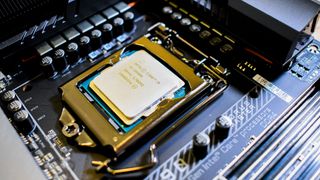Intel i9-11900K revealed to have 11% faster storage than Ryzen 9 5950X
Blazing fast Gen 4 performance

Intel’s Core i9-11900K is rumored to be launching as soon as March 2021, but the unreleased Rocket-Lake-S flagship is already making some gains against rival AMD's 16-core Zen 3-based counterpart, the Ryzen 9 5950X.
A performance comparison graph was posted to Twitter by Intel's Chief Performance Strategist Ryan Shrout that compares the two CPUs, and acts as the first official benchmark for the new i9-11900K processor.
- We’ve picked out all the best processors
- And check out the best motherboards
- We’ll tell you how to overclock your CPU
Head to head
At #CES21 we looked at Rocket Lake-S gaming. Here’s a sneak peek of Core i9-11900K PCIe Gen 4 storage performance - up to 11% faster on PCMark 10 Quick System Drive Benchmark vs the 5950X. Thanks @Malventano for the data. Backup: https://t.co/LcI5n5Cok2 pic.twitter.com/NhblHRQJSCFebruary 23, 2021
The test highlights the Gen 4 performance comparison between the two flagships, with the Core i9-11900K achieving an 11% faster result than the 5950X in PCMark 10's Quick System Drive Benchmark.
It's important to point out that this is purely a comparison of the Gen 4 performance capabilities, and isn't reflective of the general performance we could expect since the AMD Ryzen 9 5950X has more cores and threads than the Core i9-11900K.
The benchmark used a PCI Gen4 compatible 1TB Samsung 980 Pro that was attached to the PCIe riser to use CPU lanes rather than chipset lanes, as well as 32GB of DDR4-3200 MHz memory, the same software and OS versions, and an NVIDIA RTX 3090 graphics card for consistency. The full system configurations for the test as well as additional details can be found on the official Intel website.
Intel is currently fighting against AMD to retain its crown in the gaming market, but this will depend on exactly where Intel decides to pitch the new Rocket Lake CPUs in terms of their pricing. The latest speculation we’ve heard on that front sounds quite positive, with the possibility that the 11900K may come in at a cheaper level than the Comet Lake flagship, and that would certainly make for strong competition for AMD.
- Here are the best gaming PCs
Via Neowin
Get daily insight, inspiration and deals in your inbox
Get the hottest deals available in your inbox plus news, reviews, opinion, analysis and more from the TechRadar team.
Jess is a former TechRadar Computing writer, where she covered all aspects of Mac and PC hardware, including PC gaming and peripherals. She has been interviewed as an industry expert for the BBC, and while her educational background was in prosthetics and model-making, her true love is in tech and she has built numerous desktop computers over the last 10 years for gaming and content creation. Jess is now a journalist at The Verge.

